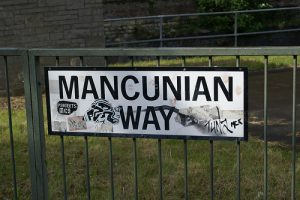 When the news started filtering through from Manchester 24 hours ago I feared the worst. Like so many of us, I hoped first that there wouldn’t be fatalities. Then I hoped that the numbers wouldn’t keep rising. And all the while I hoped that it wouldn’t be terror.
When the news started filtering through from Manchester 24 hours ago I feared the worst. Like so many of us, I hoped first that there wouldn’t be fatalities. Then I hoped that the numbers wouldn’t keep rising. And all the while I hoped that it wouldn’t be terror.
When I woke at just after 4.00am in the morning I immediately reached for my phone for the latest developments. And, of course, all those fears had been realised.
But as the story first emerged something else held my attention. This was Manchester. This was the first city I had called home. A place on the edge of which I had spent the best part of the first 18 years of my life. The city of Coronation Street, for which I’d been allowed to stay up until 8.00pm in the mid-sixties. Because it was set in Manchester.
I’ve never been to the Manchester Arena but I could locate it in my mind’s eye because it was built on the site of Manchester Victoria Station. Back in the day that was the station from which trains took me to Lancaster where I was at university.
I left home in 1979 and after I graduated in 1982 I moved to London. Shortly after that, my parents moved to Bristol and it was less obviously a place to return to. School friends had dispersed too but perhaps fortuitously with hindsight, a close university friend moved to Manchester and so I still had cause to visit fairly regularly in the eighties.
Even in my early 20s those visits had a certain nostalgia to them. This was a place that still mattered to me, that I held a special affection for. It was part of who I was. You could take the boy out of Manchester. But I was proud of where I was from.
When I visited it still passed the top deck of the bus test where the voices were those my youth. And that nostalgia was sustained by music. So much to choose from but for me, The Smiths (shame about your outburst Morrissey) and New Order were the standouts of the decade.
Though first there had, of course, been the irreplaceable Joy Division. There had been Tony Wilson. There had been Factory Records. And there had been So It Goes, the music show presented by Wilson on Granada Television when I was in my late teens.
So It Goes was a programme that took us to other places but it was also unmistakably of its place. It was new and exploratory. But it was also of Manchester. It was of our city.
All this came back to me as I tried to make sense of the senseless news. I dipped in and out of updates throughout the day but stopped short of watching interviews with eyewitnesses and survivors.
The breaking tragedy was real enough. No mistaking its present horror. And it was somewhere I knew too. Yet the news had an ethereal quality. Perhaps disbelief. Perhaps because even though I know Manchester, home has long since become another place.
But gradually I started reading the commentary of others trying to understand the meaning of the tragedy and their connections with it. And things started to fall into place. But still awkwardly. Even bewilderingly.
And then that changed when I heard Tony Walsh recite his poem, ‘This is The Place’, at the vigil outside the Manchester Town Hall in Albert Square. Of course, that was the point. This was the place which terror had visited. Not just any place, but the place. And as it happens, my place too.
The accent, the tone, the delivery, all unmistakably Manchester. The story, the sentiment, the evocation, all irresistibly Manchester. Defiant but warm and resolutely Manchester. And suddenly, for a moment, it all made sense. The place and its people were responding to something that had happened, not anywhere but somewhere. In their city.
And even though the facts were still emerging, one stood out more than any other. The suspected bomber had been born in Manchester. Although his family were of Libyan origin, he had it seems lived all his life there and had attended university in Salford. It was, extraordinarily, his city too.
But the umbilical sense of the city as place captured in Walsh’s poem must somehow have eluded him. His dislocation had been so profound that he had been able to eschew any sense of location and belonging.
How else could it have happened? Surely just a scrap of the location in the poem would have stopped him visiting such wanton destruction on this city of all places. His city. Except that it mustn't have been.
I don’t know whether there are any clues here. Not about the specifics. That’s unmistakably the stuff of murderous criminality. But clues that might help us make sense existentially. For surely we have to do that too?
I might be clutching at straws. Which of us isn’t right now? And I’m looking for explanations, not excuses because there are none.
But as I listened to Walsh’s breathtaking recital this evening, those words ‘this is the place’, seemed to speak not only to a profound sense of location. But also of the dislocation on the part of the bomber that must have made all the horror possible. Of what happens when there's no place called home.
